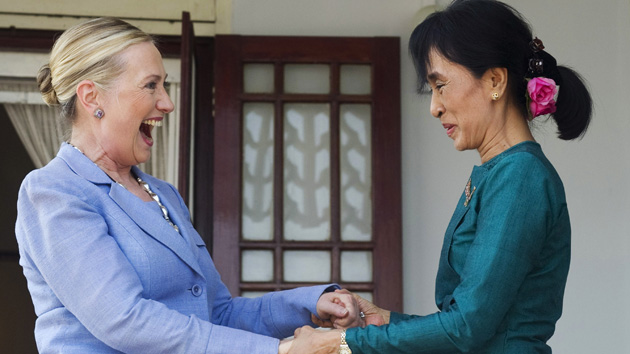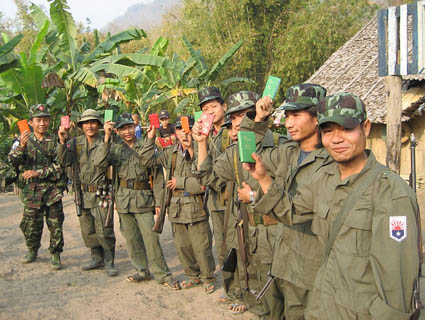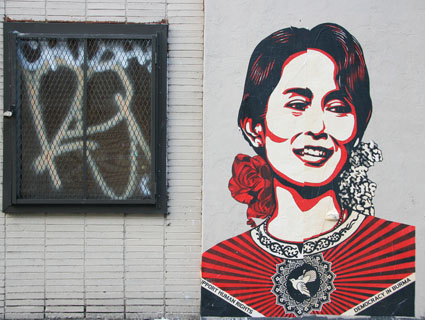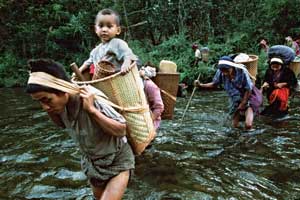
Former Secretary of State Hillary Clinton meets Burmese opposition leader Aung San Suu Kyi in Rangoon in December 2011. The two politicians met again in Washington the next year. Saul Loeb/AP
In December 2011, Hillary Clinton found herself face to face with a former Burmese general named Shwe Mann. Eleven months earlier, Shwe Mann had gone from being the third-highest-ranking official in a brutal military dictatorship to the speaker of the lower house in a democratizing nation. Now, wearing civilian clothes rather than his old green army uniform, he greeted Clinton with a compliment: “We’ve been studying your country, trying to understand how to run a parliament,” he told her. She asked whether he had been reading books or consulting with experts about democracy. “Oh no,” he said. “We’ve been watching West Wing.“
Clinton was the first US secretary of state to visit Burma (Myanmar) since before a military dictatorship came to power there in 1962. Earlier in 2011, the repressive ruling junta had surprised the world by allowing a quasi-civilian government and parliament to take the reins. The United States cautiously announced its support.
But Clinton wanted to push things further. Rather than isolating Burma with sweeping sanctions, as the international community had done in the past, she encouraged the Obama administration to offer the new Burmese government concessions like development assistance in exchange for a commitment to improve human rights. Four years later, as she makes her bid for the White House, Clinton is pointing to Burma’s political transition as a prime example of her foreign policy leadership.
During her opening statement at October’s Benghazi hearing, Clinton steered her audience to consider her success in Burma: “I worked with the Republican leader, Senator Mitch McConnell, to open up Burma, now Myanmar, to find democratic change,” she asserted. In her 2014 memoir, Hard Choices, she devoted an entire chapter to this endeavor: “While the Arab Spring was losing its luster in the Middle East, Burma was giving the world new hope that it is indeed possible to transition peacefully from dictatorship to democracy,” she wrote. Progress in Burma, she noted, was making the Obama administration’s pivot to Asia look like a success, and affirming “the unique role the United States can and should play in the world as a champion of dignity and democracy.” It was an example, she wrote, of “America at our best.”
But was it? Though Burma is preparing for a historic general election on November 8—one that’s expected to be the country’s most credible vote in decades—a closer look at its political situation shows the government there remains far from democratic.
A troubled Transition
That Shwe Mann watches The West Wing is a rarity in today’s Burma: Most of the country’s 51 million people still don’t have access to electricity, let alone a television. They live in the least developed nation in Southeast Asia. Under military rule, they also faced the threat of imprisonment for talking about politics, or the possibility that their homes would come under fire amid civil wars between the military and ethnic minority groups.
But the year of Clinton’s visit, things appeared to be changing. Burma’s new president, Thein Sein, the junta’s former prime minister, had embarked on a platform of liberalizing political reforms and began courting foreign investment in the country’s previously closed-off economy. The United States, as Clinton noted, was eager to encourage these changes. “If we could help chart the right course, the prospects for progress were better than at any time in a generation,” Clinton explained in her memoir. She wasn’t ready to completely give up the leverage that sanctions afforded the United States, but she believed “there were many carrots we could offer.”
In 2011 and 2012, the United States restored full diplomatic relations with Burma while easing sanctions and increasing investment in the country. It also committed some $375 million in development assistance from 2012 to 2014. For its part, Burma’s government released hundreds of political prisoners, signed fragile bilateral ceasefire deals with some ethnic groups, and abolished prepublication censorship of newspapers. “Experimenting with direct engagement against the advice of many friends back home had been a risky choice, but it was paying off for the United States,” Clinton wrote in Hard Choices.
Fast-forward a couple of years, and the results are less rosy. By 2014, the Burmese government was backsliding on reforms—including by cracking down on the press and political activists. As of mid-October this year, 97 political prisoners were behind bars (compared with about 25 political prisoners in early 2014), according to Bo Kyi, who leads the Assistance Association for Political Prisoners, a Burmese advocacy group. Another 471 political activists are awaiting trial, he says. “The hope that the government would put an end to human rights violations and impunity was wishful thinking,” he told Mother Jones.
Meanwhile, though the military in October signed a multilateral ceasefire with some ethnic rebel groups, including the Karen National Union, it has continued to wage bloody wars against others. In the northern part of the country, more than 100,000 civilians remain displaced from their homes amid ongoing fighting. Elsewhere, the Buddhist-majority government has failed to protect Muslims from violent Buddhist mobs: In western Burma, some 140,000 Rohingya Muslims have been locked up in squalid camps after their homes were burned down by attackers in 2012. Many of them are dying without access to medicine or doctors.
The political transition in the capital hasn’t gone as far as many had hoped, either. In 2012, Clinton met with Burmese opposition leader Aung San Suu Kyi, the Nobel Peace Prize laureate who has led Burma’s push for democracy. After spending nearly 15 years under house arrest during the dictatorship, Suu Kyi had recently been elected to parliament in by-elections, though her sights were set on a future presidency. “The behind-the-scenes maneuvering, shifting alliances, and political competition were getting intense,” Clinton wrote in her memoir of Suu Kyi’s challenges in the legislature. “Welcome to democracy!”
But in the so-called democracy of Burma, Suu Kyi can’t become president, despite her immense popularity among the Burmese people, because the former junta leaders would never allow it. In 2008, the generals rigged a referendum to pass a constitution they had written—specifically with Suu Kyi in mind—that bars anyone with a foreign spouse or close family members from the presidency. (Suu Kyi’s late husband was British, and so are her two sons.) Amendments to the constitution, like one that might lift this ban, require approval from more than 75 percent of lawmakers. Unfortunately, the constitution also reserves 25 percent of seats in parliament for unelected military representatives who have no desire to see Suu Kyi become president.
Painting burma in a better light
Clinton hasn’t completely turned a blind eye to Burma’s challenges, like the persecution of the Rohingya Muslims. But she didn’t mention the country’s constitutional troubles in her memoir, and it’s unlikely she’ll bring them up on the campaign trail. “Hillary’s reputation is partly on the line here,” says David Steinberg, a specialist on Burma at Georgetown University. “It’s not going to effect whether she gets elected or not, assuming she’s the nominee, but it will be one factor in the whole process.”
She will have help playing up Burma’s successes in Washington. In March, the Podesta Group, one of DC’s most powerful lobbying firms, inked an $840,000 deal to promote Burma’s interests in the United States. As Burmese media have noted, John Podesta, who co-founded the Podesta Group with his brother, is perhaps not so coincidentally the campaign chair for Clinton’s presidential run. The Clinton campaign did not respond to requests for comment about the deal.
This isn’t the first time Burma’s government has teamed up with Western PR firms. In the 1990s, when President Bill Clinton first placed sanctions on the junta, Burma reached out to several other US PR firms—Bain and Associates, Jefferson Waterman International, and DCI Associates—for help with its image, according to Aung Zaw, editor-in-chief of the Rangoon-based Irrawaddy magazine (where I worked before joining Mother Jones). The current deal with Podesta will help paint Burma in a better light on Capitol Hill, which could be beneficial for Hillary Clinton’s presidential bid.
A Podesta spokeswoman declined to comment on the exact nature of the firm’s work with Burma’s government. In a filing with the US Department of Justice, the firm said it would “provide strategic counsel…on strengthening the principal’s [Burma’s] ties to the United States government and institutions,” and that it would “assist in communicating priority issues in the United States-Myanmar bilateral relationship to relevant US audiences, including the US Congress, executive branch, media, and policy community.”
Meanwhile, the pro-Clinton super-PAC Correct the Record has taken up the task of highlighting Clinton’s achievements in the former pariah state. On its website, the super-PAC quotes a 2012 editorial by the Tampa Bay Times: “Clinton took a leading role in moving Myanmar’s generals to accept the modern era.”
While Steinberg agrees that the improvement of US-Burma relations has been a success—and even the Obama administration’s only success in East Asia—when it comes to Burma’s political transition, “I do not think the US can take credit,” he tells Mother Jones. The Burmese junta did not suddenly decide to hand over power to a quasi-civilian government because the United States asked it to; it had been planning to do so for nearly two decades. “This reform came from the top—it’s not like the Middle East Arab Spring,” says Steinberg.
It’s difficult to know why the junta relinquished the government, but there were likely several factors: They knew their country was falling behind economically, they may have wanted to avoid a revolt or overreliance on Chinese assistance, and, given advances in technology, they may have recognized that they couldn’t isolate their people from the outside world forever.
Today, former junta leaders are still running the show, albeit in civilian clothes, says Kyaw Zwa Moe, editor of the Irrawaddy‘s English-language edition. “To maintain their grip on power they have transformed their image from time to time,” he wrote in a commentary last year, tracing the political trajectory over the past half century, “from a military regime to a socialist dictatorship, to another military regime and finally to the current nominally civilian government.” While people in cities have seen improvements in their lives, including an easing of media restrictions and the opportunity to vote, Steinberg adds that “the real change”—improvements for the 70 percent of the population who live in rural areas—hasn’t happened yet.
Steinberg believes political change will continue in Burma, but he cautions against sweeping declarations about the situation there. When Americans generally talk about Burma, “what we have is two absolutely opposing, un-nuanced views: that Burma was all bad before, and that now Burma is all good” he says. But although the country is preparing to head to the polls, he adds, the generals never intended to create a “democracy,” as we know the term. Instead, they admitted that they were aiming for a “disciplined democracy,” meaning a democracy guided by the military leadership. So when you look at the situation on the ground, don’t be fooled, Steinberg says: “It’s not democracy.”














